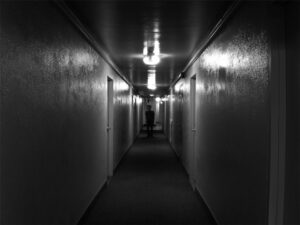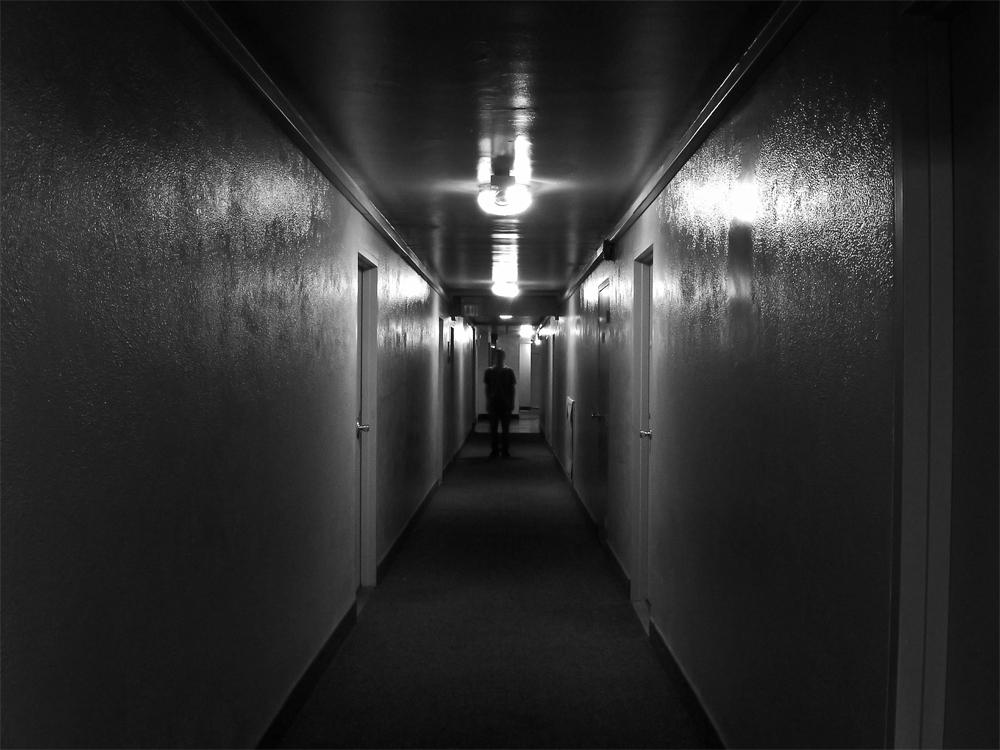By NICK STORY

The Rectangle
When my marriage ended I moved to an apartment building that was mostly uninhabited. I never saw the other tenants. There were traces of them here and there—a sock left in a dryer, muted weeping down the hall, ambulances flashing out front—but I couldn’t have told you what any of my neighbors looked like.
There was a serious cockroach infestation in my unit. In the kitchen, the roaches chewed through boxes of crackers, fresh fruit, bags of rice. They crawled over the counters, peeked up through the sink drain, and burned in the oven. In the middle of the night, I’d spot them on the ceiling, circling the kitchen light like planets in a model solar system.
At first, I maintained a zero-tolerance policy toward the roaches. Whenever I saw one, I’d reach for a shoe or a book. Some days I’d be sweaty from slaughter. But no matter how many I killed, no matter how much effort and strategy I put into my campaigns, there were always more. I’d smash a dozen during the day and wake to one crawling up my leg that night.
Of course I complained, and the property manager always looked concerned when I brought the issue to his attention, but he wasn’t much help. It wasn’t malice or laziness that kept him from doing something about the infestation. I don’t think he was all there mentally, if I can say that. He suffered from the effects of Agent Orange exposure, among other things. A few times a week I’d see him in the courtyard with his portable oxygen tank, nailing boards together to no obvious purpose.
After months of begging, he finally called an exterminator. The exterminator was a pudgy guy with a gray bowl cut and an unevenly trimmed mustache. I followed him from room to room as he sprayed along the walls. He told me about his most memorable exterminations. One time he gassed his girlfriend’s miniature schnauzer by accident. “She stopped loving me after that one,” he said, squirting jets of clear poison into the corners of the kitchen.
I felt something like giddiness as the exterminator went about his business. He’s come to help me, I thought. He cares. Even after he left, just thinking about his mustache made me feel warm.
The infestation remained, however.
If anything, the roaches seemed emboldened. One night they appeared to constellate into the word NO on the wall behind my TV. With a black marker, I wrote YES on the opposite wall and underlined it twice for emphasis.
One afternoon, I saw a big guy crawling on my desk, one of the biggest I’d ever seen—six inches and shiny and stepping carefully onto my workstation. I grabbed my tennis shoe and raised it, but before bringing it down, I deliberated. Should I really, at this point, continue to fight so hard? Or should I do what many others have done, and acknowledge the building’s irredeemable dirtiness—that it was simply the kind of place where roaches lived? Was hoping for a roach-free apartment a delusion, a waste of energy better spent on other things? Or was the possibility that my life could become more similar to my dreams—hopeless as this prospect seemed most of the time—worth the struggle and the mess?
The roach ran over the keyboard, depressing A, S, and a handful of numbers, and I had the thought that came into my head at least ten times a day: I could really use some advice right about now. Some solid, well-considered tips on what to do and how to be. While I was pondering what someone wise might say to me, the roach disappeared through one of the cracks in the wall.
I broke the lease and moved out a few months later. (The next apartment wasn’t much better.) But the way this particular chapter in my life resolved was this: I stopped going after the roaches and instead developed a purely defensive strategy. By creating a perimeter of packaging tape around the bed—sticky side up—I kept them from crawling on me while I slept. I had to redo the Rectangle every few days because inevitably I’d step on the tape and ruin it. My system must have worked okay, though. I was sleeping better, for one, and in the morning there was always a new roach stuck on the tape, struggling, and I’d think, well, that guy would have been all over me if not for the Rectangle.
And every night before falling asleep I would fold my hands and say “Praise the Rectangle.” It was a joke. It made me laugh there in the dark room. “Praise Him! Praise the Four-Sided Figure!” But it was serious too, because nothing else that I was aware of was protecting me.
Alice
Alice is my elderly neighbor. She lives across the hall in 2B. For some reason we always frighten each other. We aren’t scary people, but we have a tendency to appear suddenly to each other. When I’m in the hall and she opens her door and pops out, I startle, drop my keys. Sometimes I shout or shriek, and when I do this, I pretend that I am on the phone or clearing my throat or something.
When she’s putting her trash bag down in front of her door, I open my door and she jumps, feels for her heart. Once she dropped the trash and leftover Chinese food and empty soup cans spilled all down the stairs.
“Sorry,” I said, scrambling to help her pick it up. “So sorry!”
Every time I get something from the utility closet, Alice seems to be in there, gaunt and pale, hair wild, and we both scream.
“Just…looking…for a…lightbulb,” she’ll pant.
“Me…a broom…ha…sorry,” I’ll say.
Once when I was coming down the hall and saw that her door was open, I dove behind a potted plant until she shut it.
Even when we don’t see each other it’s an issue. Our walls are thin. When a book falls to the floor in my apartment, I hear her gasp. When she turns on the country music station in the late evening, my heart races and my sweat turns cold.
We are always apologizing when we see each other, and it’s not always clear what for.
Many nights I’ve walked home from the bar to see her leaning out the window, smoking a cigarette. In the dark, backlit by her flickering TV, she looks like a ghost come back for vengeance on the living. Even after I’ve gotten within speaking distance and established that she is no ghost, after we wave and smile and say good evening, I am still afraid, sometimes for hours. Sometimes, after seeing her in the window, I have dreams in which Alice is punishing me with knives.
Alice has a medical condition and cannot get down the stairs easily. A social worker brings her groceries and things. She leaves her trash outside her door for me to take down. When she thanks me for taking her trash down, she does so in a manner so heartfelt that it embarrasses me. I take great pains to avoid her thank you’s. Each one makes me feel a bit ill.
The ambulance has come to take Alice to the hospital three times since I moved in. It worries me. I sometimes wonder whether I should learn more about Alice’s condition, just in case something happens. But I don’t ask, and Alice doesn’t tell. I assume it’s under control, though I don’t always have confidence in this assumption.
I worry that our mutual fear puts strain on Alice’s condition. All the scares can’t be good for her. So, I walk softly up the hall and I turn the key in my door quietly. I make no sudden movements after 8pm. I think of Alice’s heart. I Do Not Disturb.
But turning down the volume on my existence makes me feel like a sneak, like I’m up to something, even though I’m usually not up to anything. Alice must feel this way too because once, when she saw me sneaking up the stairs at night, she fainted. Just toppled clean over like some vaudevillian doing a prat-fall. I had to revive her with a wet wash cloth. I said I was sorry many times while wiping her face.
She had a procedure done at the hospital yesterday. I thought I’d bring her some ice cream. Brambleberry Crisp. I knocked on the door and it opened, so I went in.
The room smelled of cigarettes and there were dishes in the kitchen sink. There was a coffee table slightly askew in the center of the living room, a yellow couch, a TV, framed pictures everywhere. In one, Alice is wearing a velociraptor costume. In another, she’s near a farmhouse under an evening sky filled with silvery stratus clouds. In another, she is sitting on her desk in a college dorm room in the 1970s, wearing maroon tights, smirking at the cameraperson. Dozens of people spanning several decades surround and hold her in the photos. Who are they? I wonder. And where are they? I have never seen anyone visit. I put the ice cream in her freezer and leave the apartment in a hurry. I don’t want to see those pictures again.
Why do we keep scaring each other? It seems Alice and I have forgotten that both of us has the other for a neighbor, or even what a neighbor consists of: a body, a voice, footsteps, sighs, whistling tea kettles. We have forgotten, and so we don’t expect these signs of presence. We are surprised by them. Sometimes scared.
Sometimes, I think we have forgotten each other on purpose. If I remembered Alice too often, if I seriously thought about Alice in that room by herself with all her photos for any length of time, I’d end up contracting some of her suffering. And maybe she is afraid that I will give her some of mine as well.
When she returned from the hospital this morning, she had balloons tied around her wrist. Red, blue, and gold balloons that said Congratulations! All evening I’ve been hearing them pop, one by one.
The New Place
They are building a new house outside my apartment window. The house is so close that I can reach out and touch the wood frame where a wall will be. Every morning I hear the whine of saws and the pounding of hammers. I hear the confident guitar solos of the classic rock radio station that the builders enjoy.
The house is coming up fast and I am glad for the local economy. Everyone says it needs a boost. The house will be beautiful, perhaps blue.
But I worry. Who will live there? A family dealing with depression? An important woman? I have a feeling that whoever they are, they will hate me: they will think that I don’t make sense next to their beautiful new house. They will come to my door and ask me to leave. This is just a feeling I have.
Will they be polite or rude when they ask me to leave? It doesn’t matter. Either way, I will oblige them. I don’t want to inconvenience anybody. I will bear my displacement with good cheer. I will pack my bag and wave goodbye in an extra-friendly way. I might leave a bouquet or a six-pack on their doorstep and a card that reads: Farewell!
I will search for a house somewhere else in the city, a freshly-built house just outside the bedroom of some other citizen who cannot sleep, who wonders what to do with the days he has left. I will move in immediately. I might go in through a window if there isn’t a key under the doormat.
The new house will have been built just for me. When I move through the rooms they will be just how I like my rooms to be. This is how I will know that I’m really home, by the feel of the rooms.
But I will see my new neighbor through the window—he cannot afford curtains or blinds—pacing and worrying in his house. He’ll be a sorry sight. I will watch him tug at what’s left of his hair and weep on the phone. He will see me learning piano scales and at get-togethers with a glass of punch in my hand. I will glare until he hides his face, or ducks behind a wall. Every day I will make sure that he sees me, sees my eyes, until he packs up and moves away.
Nick Story is a writer living in Madison, Wisconsin. His fiction has appeared in the Indiana Review, Molotov Cocktail, and The Cafe Irreal.
Photo courtesy of Flickr Creative Commons user Night Heron.




